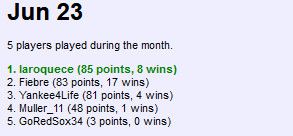-
Posts
26978 -
Joined
-
Days Won
82
Content Type
Profiles
Forums
Downloads
Everything posted by Yankee4Life
-
3 out of 10, 204 seconds. These were supposed to be easy questions?
-
10 out of 10, 75 seconds. This was my best in quite awhile.
-
6 out of 10, 264 seconds. I got the first four wrong but then I rebounded and got the final six right. Took some time though.
-
10 out of 10, 138 seconds. A nice comeback after the past few days.
-
I know your stance on this team. What I'm trying to do is bring up things that can be talked about.
-
4 out of 10, 194 seconds. We got a tough one today.
-
I have some questions for the regular users here and Ritchie you don’t really have to answer because in your view the Yankees have been slip, sliding, away since New Year’s Day. 1. What is your view as to why they can not hit at all? Remember, they fell apart in late June and because of their big lead they got into the playoffs. That’s not the case this year. The way I see them they have a bad hitting team and that does not matter if Judge is in the lineup. 2. Look at Carlos Rodon last night. He is the only major off season acquisition that the Yankees made last off season. Franchy Cordero does not count. That was supposed to solve things? 3. We have in my opinion the worst manager in the American League if not all of baseball. Aaron Boone does not ever criticize his players even when they ask for it. Gleyber Torres loafs to first base a lot. Stanton pulls a hamstring because he thought he hit a home run and went into his jog and then saw it hit off the wall. Sometimes these guys need a kick in the pants but all this guy does is give back rubs. I do not want to fall into the trap and say that Billy Martin would have done this or Billy Martin would have done that but with all the flaws that Martin had he was still better than Boone because he would never coddle these players like Boone does (see: Reggie Jackson, Fenway Park, June 18, 1977) because if they did not hustle they would hear it from him. Not Boone. You can always count on him making excuses. 4. I got spoiled as a Yankee fan having good general managers running the front office. Gabe Paul, Al Rosen, Gene Michael for example. Now we have Brian Cashman that deserves every bit of flack he gets. We entered 2023 without a left fielder and for some reason they do not let Estevan Florial up to see what he can do over a matter of months instead of ten at-bats. Jake Bauers is no outfielder but throw him out there! Why not? If he hits a home run when they are down 9 - 1 in the ninth it is all worth it. These are the New York Yankees? We have four guys hitting around .120, give or take a few points and Stanton, who is out-and-out stealing money from the ball club is one of them. But by all means, keep on sending them out there and when nothing changes don’t act surprised.
-
I didn’t watch the game last night but that’s not news. I’m happier this way. To answer your question about Severino all I have to do is point you at the worst manager in baseball, Aaron Boone. The double talk out of that guy is amazing at times. I did not read the game write-up this morning but I am sure he found something positive about last night. This guy needs to be fired. I miss the no-nonsense of George Steinbrenner. The good news is Severino is a free agent this off season. The bad news is that he is a free agent this off season. Cashman will sign him to a six-year contract.
-
9 out of 10, 211 seconds. I missed a very easy one.
-
Thank you. This is what happens when the kiddies are on summer vacation.
-
This one was a tough one, at least for me. When we get to the day where they ask easy baseball questions then you are really going to take off. For example you may see something like this. What city do the Chicago Cubs play in? A. New York B. Pittsburgh C. St. Louis D. Chicago
-
2 out of 10, 240 seconds. A pitiful performance!
-
That is the winning combination here Jim. As many as you can get right in the least amount of time. In other words just do the opposite of me. 😄
-
7 out of 10, 241 seconds. Some tricky ones here.
-
Hahahahaha. Yeah, two days and he's impressive. I think it is great someone else joined. 👍
-
3 out of 10, 101 seconds. I had no idea today. None at all. Good going Jim. Impressive!
-
These were tough questions Jim. Sometimes they have an easy category and then they ask questions from other sports and that is what kills me. Above all, welcome and best of luck to you. I have been lucky so far. But even with that you got eight right. You're on a run!
-
5 out of 10, 262 seconds. A tough one.
-
This is a highly inconsistent team bordering on being an embarrassment. Why should it matter if they went 3 - 3 against last place teams? I’m happy they won three. People might say “if only Judge was in there!” It didn’t matter last year. Inconsistency is what beats them and it has nothing to do with who they are playing. And by the way I am curious. What does wait ‘till next year mean here? Is next year going to be the magic cure for what ails this team? Will the injuries be under control in 2024? How about the hitters? Will they automatically start to hit next year? Wait ‘till next year was the old Brooklyn battle cry that was based on optimism. I am not optimistic that everything will be ok in the Bronx because the calendar reads 2024.
-
10 out of 10, 111 seconds. No challenge with today's questions.
-
Ok the month of June is done and we have a new winner in laroquece! This may have been the closest one we've had yet. He had 85 points to beat Feibre by two points and me by four. Congratulations man! Starting July I had 7 out of 10, 259 seconds. Mediocre at best.
-
10 out of 10, 201 seconds. A good way to end the month.
-
And they have also won many when they have not thrown any no-hitters. For example in that wonderful season of 1978.
-
I never implied that. It was one game and it was something that German and the Yankee hitters really needed.





